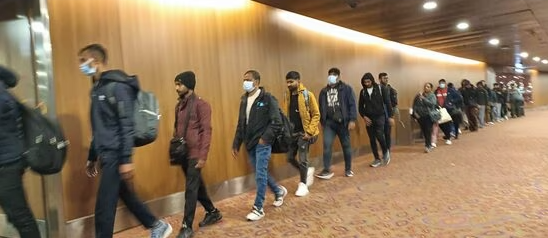In a startling turn of events, 276 Indian nationals, originally bound for Nicaragua, found themselves detained in France over suspicions of human trafficking. The group, which had been held at Vatry airport near Paris for four days, finally returned to Mumbai in a charter A340 Airbus aircraft early on Tuesday. The incident has raised concerns and sparked investigations into the circumstances surrounding their detention.
The Indians, who had embarked on their journey with hopes of reaching Nicaragua, were halted in France amid suspicions of being involved in human trafficking. French authorities, in collaboration with international agencies, subjected the passengers to extensive questioning and investigations to ascertain the nature of their travel and the reasons behind the suspicions.
The charter aircraft’s arrival at Mumbai airport drew significant attention, with authorities and media closely monitoring the situation. As the passengers disembarked, they were met with a barrage of questions and scrutiny, reflecting the gravity of the allegations that had led to their detention in France.
While details surrounding the suspicions of human trafficking remain limited, it is understood that the French authorities acted based on specific information or indicators that prompted them to intervene. The case has now triggered investigations both in India and France, with officials working to unravel the complexities of the situation.
The incident highlights the challenges faced by authorities in combating human trafficking, a pervasive issue that transcends international borders. Governments worldwide have been intensifying efforts to curb human trafficking, recognizing the need for collaborative strategies to address this grave violation of human rights.
The return of the 276 individuals to Mumbai has prompted questions about the accuracy of the suspicions that led to their detention in France. As investigations unfold, there is a growing urgency to understand the circumstances surrounding their travel and whether any criminal activities were indeed involved.
Human trafficking remains a global concern, and instances like these underscore the importance of vigilance and international cooperation in addressing this illicit trade. The incident serves as a reminder of the complexities involved in monitoring and regulating international travel to ensure the safety and well-being of individuals.
As the investigations progress, there is a heightened awareness of the need for comprehensive measures to combat human trafficking and protect vulnerable populations from falling prey to such criminal activities. The case of the 276 Indians detained in France brings into focus the challenges faced by law enforcement agencies in safeguarding human rights on a global scale.








 India
India












